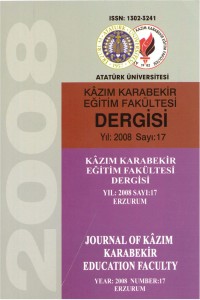Yıl 2008,
Sayı: 17, 228 - 242, 03.12.2010
Anahtar Kelimeler
Duygusal zeka öğretmenlik uygulaması öğretmen adayı değerlendirme formu
Kaynakça
- Acar, F.T. (2001). Duygusal zekd yeteneklerinin göreve I'e insana yönelik liderlik davramşları ile ilişkisi, İstanbul Üniversitesi, Sosyal Bilimler Enstitüsü, Doktora Tezi.
- Bar-On, R. (I 997). EQ-i Bar-On Emotional Quotienı Inventory. , MultiHealth Systems, Toronto, ON.
- Beceren. E. (2004). Duygusal Zekiı Nedir?, http://www.duygusalzeka.com.
- Feldman, K. A (1976). The superior college teacher from the studenı'">' view. Researeh in Higher Edueation, 5, (3), 243-288.
- Fumham, A,and Greaves, N. (1994). Gender and locus of control cOITelaleS ofbOOy image dissatisfaction. European Journal ofPersonality, 8, 3, 183200.
- Goleman, D. (1998). Working wirh emotional inıelligenee. New York; Bantam Books.
- Goleman, D. (2006). Duygusal Zekiı Neden lQ'dan Daha Önemlidir? 30. Baskı. çev. B. S. YükseL. Varlık Yayınları. İstanbuL.
- Grossman, M., Wood, W. (1993). Sex differences in inlensity of emotional experience: A social role interprelation. Journalaf PersonaUty and Social Psychology, 65,5.1010-22.
- Justice, M., and Espinoza, S. (2007). Emotional intelligence and beginning teacher candidates. Edueation, 127 no 4, p: 456-461.
- Lamport, M. A (1993). Student-faculty inforoıal internction and the effect on college student outcomes, Adolescence, 28 (112).971-991.
- Miller, N., Si1vennan. K., and Faik, F. R.(1994). Emotional development. intellectual abilily and gender. Journalfor ıhe Edueaıion ofthe Gifted 18. 1,20-38.
- Nelson, D. B and Nelson, K. W. (2003). Emotional Intelligence Skills: Significant factors in freshman achieveınent and relenıion. Paper presented at the American Counseling Association Conlerence (Anaheim, CA, March 21-25,2003).
- Parker, J. D. A., Summerfeldt, L. 1., Hogan, M. l., Majeski, S. A., (2004). Emotional intelligence and academic success: Examining the transition from high school to university, Personalit} lInd Individııaf D!tf"erence.l'. 36, 163-172.
- Pianta, R. C. (1999). Enhancing relationships bell-reen chi/dren and teachers. Washington, OC: American Psychology Association.
- Salovey, P. and Mayer, J. D. (1990). Emotional lnıeJ1igence, lmagination Cognition and Personality, 9,185-211.
- Stein, S. J. and Book, H. E. (2000). The EQ edge: cmolıonal intelligence and your success. Toronto, Canada: Stoddarto
- Sutarso, T., Baggett, L. K., Sutarso, P., Tapia, M.(1996). EfTecl of gender and GPA on emotional intelligence. Paper presented at the annual meeting of the Mid-South Edueatıonal Research Associalıon (Tuscalooosa, AL. November. 1996).
- Timm, .I. P. (1993). The refatlonship betH'een leacher.\" slme ofmind and the efJeclil'e climate in the classroom: implications for psydıology of mind as applied lo teacher education. Goddard College, Plainfeld, Vermont.
- Watkin, C. (2000). The leadership program for serving head teachers: Probably the word's largesI leadership development initiative. The feadeı~~hip ({nd organizational development Journal, 21, (1),13-19.
- Yüksel, M. (2006). Duygusal zekd ve performans ilişkisi (bir uygulama), Atatürk Üniversitesi, Sosyal Bilimler Enstitüsü, İşletme Anabilim Dalı, Yüksek Lisans Tezi
Yıl 2008,
Sayı: 17, 228 - 242, 03.12.2010
Kaynakça
- Acar, F.T. (2001). Duygusal zekd yeteneklerinin göreve I'e insana yönelik liderlik davramşları ile ilişkisi, İstanbul Üniversitesi, Sosyal Bilimler Enstitüsü, Doktora Tezi.
- Bar-On, R. (I 997). EQ-i Bar-On Emotional Quotienı Inventory. , MultiHealth Systems, Toronto, ON.
- Beceren. E. (2004). Duygusal Zekiı Nedir?, http://www.duygusalzeka.com.
- Feldman, K. A (1976). The superior college teacher from the studenı'">' view. Researeh in Higher Edueation, 5, (3), 243-288.
- Fumham, A,and Greaves, N. (1994). Gender and locus of control cOITelaleS ofbOOy image dissatisfaction. European Journal ofPersonality, 8, 3, 183200.
- Goleman, D. (1998). Working wirh emotional inıelligenee. New York; Bantam Books.
- Goleman, D. (2006). Duygusal Zekiı Neden lQ'dan Daha Önemlidir? 30. Baskı. çev. B. S. YükseL. Varlık Yayınları. İstanbuL.
- Grossman, M., Wood, W. (1993). Sex differences in inlensity of emotional experience: A social role interprelation. Journalaf PersonaUty and Social Psychology, 65,5.1010-22.
- Justice, M., and Espinoza, S. (2007). Emotional intelligence and beginning teacher candidates. Edueation, 127 no 4, p: 456-461.
- Lamport, M. A (1993). Student-faculty inforoıal internction and the effect on college student outcomes, Adolescence, 28 (112).971-991.
- Miller, N., Si1vennan. K., and Faik, F. R.(1994). Emotional development. intellectual abilily and gender. Journalfor ıhe Edueaıion ofthe Gifted 18. 1,20-38.
- Nelson, D. B and Nelson, K. W. (2003). Emotional Intelligence Skills: Significant factors in freshman achieveınent and relenıion. Paper presented at the American Counseling Association Conlerence (Anaheim, CA, March 21-25,2003).
- Parker, J. D. A., Summerfeldt, L. 1., Hogan, M. l., Majeski, S. A., (2004). Emotional intelligence and academic success: Examining the transition from high school to university, Personalit} lInd Individııaf D!tf"erence.l'. 36, 163-172.
- Pianta, R. C. (1999). Enhancing relationships bell-reen chi/dren and teachers. Washington, OC: American Psychology Association.
- Salovey, P. and Mayer, J. D. (1990). Emotional lnıeJ1igence, lmagination Cognition and Personality, 9,185-211.
- Stein, S. J. and Book, H. E. (2000). The EQ edge: cmolıonal intelligence and your success. Toronto, Canada: Stoddarto
- Sutarso, T., Baggett, L. K., Sutarso, P., Tapia, M.(1996). EfTecl of gender and GPA on emotional intelligence. Paper presented at the annual meeting of the Mid-South Edueatıonal Research Associalıon (Tuscalooosa, AL. November. 1996).
- Timm, .I. P. (1993). The refatlonship betH'een leacher.\" slme ofmind and the efJeclil'e climate in the classroom: implications for psydıology of mind as applied lo teacher education. Goddard College, Plainfeld, Vermont.
- Watkin, C. (2000). The leadership program for serving head teachers: Probably the word's largesI leadership development initiative. The feadeı~~hip ({nd organizational development Journal, 21, (1),13-19.
- Yüksel, M. (2006). Duygusal zekd ve performans ilişkisi (bir uygulama), Atatürk Üniversitesi, Sosyal Bilimler Enstitüsü, İşletme Anabilim Dalı, Yüksek Lisans Tezi
Toplam 20 adet kaynakça vardır.
Ayrıntılar
| Birincil Dil | tr;en |
|---|---|
| Bölüm | Makaleler |
| Yazarlar | |
| Yayımlanma Tarihi | 3 Aralık 2010 |
| Gönderilme Tarihi | 3 Aralık 2010 |
| Yayımlandığı Sayı | Yıl 2008 Sayı: 17 |


